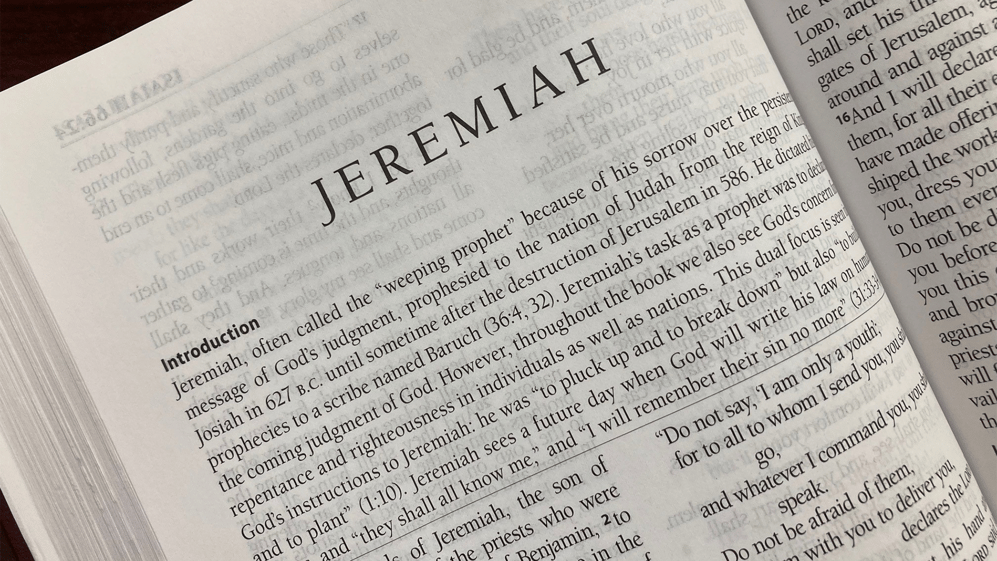We have a lot to learn from Jeremiah and his mixture of Law, Gospel, and doctrine. The prophet, best known for his extreme demonstrations, gives abounding examples of God's correction, highlighting His mercy and grace. The following is an excerpt on themes in Jeremiah from The Lutheran Bible Companion.
We are better informed about the details of Jeremiah’s life than of any
other prophet, thanks mostly to copious information found within his book itself. There is no prophet where detailed knowledge of the tortuous history
of the period is as important for understanding as in the case of Jeremiah.
Although very precise historical data are sometimes given, the problem is
complicated by the often completely unchronological order in which Jeremiah’s oracles occur—another reminder that presentation of history in
biblical thought is not identical with the modern chronological and documentary ideals. …
Specific Law Themes
In the opening oracle, the Lord tells Jeremiah that the nations will be plucked up, broken down, destroyed, and overthrown. Jeremiah commonly warns about the punishment of Judah by sword, famine, and pestilence. He derides the faithless shepherds whom God and the community had entrusted with leadership in both the civil and religious spheres. A favorite expression of Jeremiah is the word turn used to describe repentance. Since the Judeans forsake the Lord and His covenant and pursue idolatry, they will be cursed like Sodom.
Specific Gospel Themes
Compared with a prophet like Isaiah, Jeremiah offers less consolation. However, the arrangement of his book is such that the overwhelming darkness of his oracles amplifies the brilliance of God’s grace. Jeremiah records that nations will be built and planted as the Lord relents from His wrath and promises healing. The remnant will return. A righteous Branch will sit on David’s throne. Jeremiah’s most important Gospel theme is the new covenant and the promise of new hearts, which occur in what commentators call the “Book of Comfort” (chs 30–33). God is steadfast in love and mercy. As He judges the nations, He will deliver His people.
Specific Doctrines
Although Jeremiah repeats many earlier themes of biblical theology, such as those in Deuteronomy, theologians have turned to him especially for the doctrines of sin, the Lord’s correction, repentance, and trust in Him.
For example, Jeremiah records how the Lord curses mankind’s trust in self (17:5–6) because the human heart is desperately wicked (17:9–10). The Lord instructs sinners through discipline and correction (10:23–24; 30:11; 31:19) with the goal of restoring them through repentance and trust in the Lord alone (17:7). Jeremiah notes that Israel’s basis of fellowship with God was not the sacrifices of the Mosaic covenant of themselves, but the Word of God that the people should hear and believe (7:21–23). Since Israel cannot fulfill the old covenant, the Lord promises to provide a new covenant focused on His Word and faith (ch 31). This becomes the most important prophecy of the book, the basis of New Testament revelation in Christ (Hebrews 8:8–13; 10:16–17), and the title of the New Testament feast of the Lord’s Supper, which is called the “new covenant” (Lk 22:20; 1Co 11:25; cf Mt 26:28; Mk 14:24).
The Lord insists that Jeremiah speak His Word with boldness (Jer 15:19) and says that He will teach the people to invoke His covenant name, Yahweh, with genuine trust (23:5–6; 33:16). In fact, they can call on Him even to bless their enemies and conquerors, the Babylonians (29:4–7). In all these ways, the Book of Jeremiah shows its importance to Christian theology.
Read more in the Jeremiah Commentary.
Blog post adapted from Lutheran Bible Companion, Volume 1: Introduction and Old Testament, pages 751–52, 768–69, copyright © 2014 Concordia Publishing House. All rights reserved.











